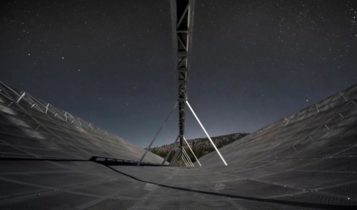© 2000-2023 - Enkey Magazine - All rights reserved
ENKEY SNC - VAT ID IT03202450924 / REA Code CA253701 - Phone. 078162719
Recently, the new radiotelescope CHIME, in Canada, intercepted 13 mysterious radio signals coming from the deep space, far away from the Milky Way. Totally the radio signals, of unknown origin, registered in the years were 60, of which two intermittent, repeated over the time.
The radio signals
The signals are the Fast Radio Burst, signals of just few milliseconds. Totally were recorded 60 of them, of which origin is unknown, the thing that’s sure is that they come from outside the Milky Way.
Two of them are intermittent. The first one, the FRB 121102, was catched for the first time in the 2007 and it seems to be originated in a small dwarf galaxy, three billions of light years away.
The second one is the FRB 180814, located in a galaxy 1,5 billions of light years away. This is a part of the thirteen radio signals recently noted by the CHIME. The intermittent radio signal generated six radio pulses, few milliseconds long each.
The radiotelescope CHIME

The CHIME (Canadian Hydrogen Intensity Mapping Experiment) is a really powerful radio telescope of new generation.
The radio telescope is located in Canada, in the Valley of Okanagen, in the British Columbia, and it was inaugurated in the 2017. The massive implant of the CHIME is composed by four semi-cylindrical antennas hundred meters long.
Betweeb July and August of the 2018, in a three weeks session, the radiotelescope catched the mysterious thirteen radio signals. But the instrument works in a down-scaled capacity, during the tests, so it collected a reduced quantity of informations compared with its real potentialities.
Potentialities really important if we think that in more than ten years were noted less than 50 radio signals, while in just three weeks of operativities, the CHIME registered already 13 of them. And the structure is not fully operative yet neither.
The scientists of the CHIME

To elaborate the datas collected the last summer by the radio telescope were the scientists of the University of the British Columbia, of the University McGill, of the University of Toronto and of the National Research Council of Canada.
The collected datas have brought to light, so, the second intermittent radio signal ever collected in the history. But not only, the other twelve radio signals, are significatelly particular too.
The biggest part of the Fast Radio Burst registered until now, infact, had a frequency around the 1.400 Mhz, while the last ones have a frequency, in some cases even lower than 400 Mhz.
But the CHIME isn’t fully operative yet, when it will be fully operative, maybe, it will be able to give an explaination about the origin of the mysterious signals.
One of the CHIME’s researcher, Deborah Good, commented the study and the potentialities of the radiotelescope like that: “We are really excited to discover what the CHIME can do when it will fully work. At the end of the year we may have found other 1.000 bursts. Our datas will put the word end to some of the FRB’s mysteries”.
Hypothesis about the origin
Like we said the origin of the signals is still a mystery. We know more or less the spatial location, but what does create them? A so low frequence, which suggests a signal’s leakage, let us think that those come from areas of the Universe with unique characteristics.
The hypothesis about it are mainly two. The first one thinks that they come from a pulsar, a neutrons’ star with a really strong magnetic field which turns on itself at incredible speeds.
The second one, instead, assumes the fusion between two neutrons’ stars. But one thinks even that the signals come from residues of a supernova or from the area of the supermassive black hole which is in the center between the galaxies.
Finally, right the peculiarities of the last discoveries, with so low frequences, let us think that the origin isn’t cosmological but artificial.
This post is also available in:
 Italiano
Italiano

